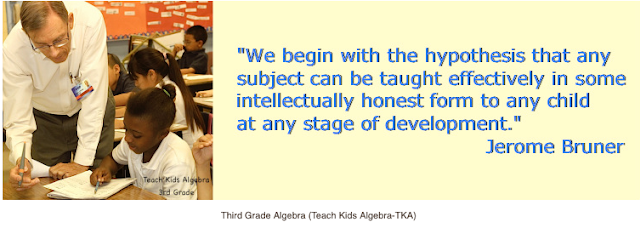Teach Kids Algebra (TKA) is a singular, innovative algebra project for typical students grades 1 to 4. Students use arithmetic to learn basic algebra ideas such as variables, equations, functions, negative numbers, graphs, etc. The TKA curriculum is designed to challenge students at a much deeper level than traditional elementary school mathematics. TKA is more content and less enrichment. Still, most students can learn it given prerequisites and the proper instruction.
Teach Kids Algebra or TKA helps build a mathematical background for future studies in math, science, engineering, computer science, and so on. TKA is STEM math for elementary school students. Even 1st graders dive right into numerical equations and equations in one variable.
 |
| TKA 3rd Grade 2011-2012 School Year |
TKA does not follow Common-Core-aligned textbooks or the state's curriculum. I make a list of skills students need to learn to be successful in Algebra-1, then I figure out the most efficient methods to teach those skills to young beginners. The lessons are not student-centered. The goal of the lessons is not to support the self-esteem of children or to boost their creativity. The main goal is learning content (i.e., factual and procedural knowledge) to prepare for harder math later on. Students must use arithmetic stored in long-term memory to do problem-solving in working memory.
I started from scratch, fusing algebra ideas into basic arithmetic.
When I started giving algebra lessons to 1st through 3rd grades, I made a topic list. Then, I developed specific behavioral objectives (i.e., performance-based, Mager) and sample problems (i.e., worked examples) to explain how to perform. I often asked the students questions and gave them a couple of problems to work on their own (guided practice). Finally, I handed out the lesson's practice sheet (independent practice), which included both current and problems from previous lessons (review). For the remaining 30 minutes, I walked around the room to give encouragement and corrective feedback to individual students. I called my algebra program Teach Kids Algebra or TKA. Sessions were weekly for an hour.
In short, I constructed my curriculum, but I used Gagne's idea of building knowledge hierarchically. I identified the prerequisites needed for the student to perform the objective. One idea builds on another. It's called background knowledge.
Algebra is symbolic arithmetic. In my algebra program (TKA), algebra ideas build on basic arithmetic students know or should know (i.e., factual and standard procedural knowledge). TKA is an enrichment program given once a week for an hour. For 1st and 2nd graders, the lessons lasted 7 weeks (i.e., 7 hours). TKA reinforces basic arithmetic and points out weaknesses that teachers can correct. TKA helps students get ready for algebra.
TKA is not progressive teaching. It is the opposite. It is explicit teaching with feedback. In short, I teach children algebra, not reform math. I do not follow the district's or state's curriculum. I explain content the first half-hour with worked examples and give "guided practice," then, as students work independently on a practice sheet, I roam around the room, answering questions, giving hints, and offering encouragement and feedback—no group work, no calculators, no manipulatives, no Common Core, and so on.
Many allege that algebra in the early grades is not developmentally appropriate. How would they know? The same old progressive assumptions and theories that put our kids behind in the first place continue to haunt us.
Like Singapore, I embrace the ideas of Bruner, not Piaget.
 |
| Bruner, not Piaget! |
The 7 lessons of TKA for 1st and 2nd grade.
The lessons were extended for older students in grades 3 to 5 (20-25 Lessons) with more emphasis on writing equations (English to math symbols), solving a wide range of equations using algebraic techniques (inverses), y = mx+b, integers (4 operations), fractions (4 operations), evaluating expressions, simplifying expressions, geometry, working with square roots, equal ratios and solving proportions, etc.
➡ 1st-Grade Teach Kids Algebra (TKA), Spring 2011
Fusing Algebra to Standard Arithmetic.
- True/False & Equality (=) "Think Like A Balance."
- Equations in One Variable, Guess & Check
- Equations in Two Variables (Input-Output Model)
- Function Rules & Building x-y Tables
- Plotting Points in Q-I & Finding Perimeters
- Graphing Linear Equations in Quadrant I
- Given y, Find x (Reverse, Undo) & Steepness of a Line (Slope)
David G. Bonagura Jr. writes in the Wall Street Journal, "Contrary to today's education theories; memorization is critical in the classroom and life." Memorizing math facts and standard procedures is good for kids. It enables them to solve math problems.

"Extracting a math problem from a word problem requires a high level of critical thinking," writes Professor W. Stephen Wilson, Johns Hopkins. It is called mathematizing (English words to math symbols and vice versa). Students should extract numbers and write an equation to symbolize and model the word problem.
For additional information, click Teach Kids Algebra (1-6-18)
Updated 5-25-19, 5-28-19, 1-10-2020
©2019-2020 LT/ThinkAlgebra.org
Updated 5-25-19, 5-28-19, 1-10-2020
©2019-2020 LT/ThinkAlgebra.org
